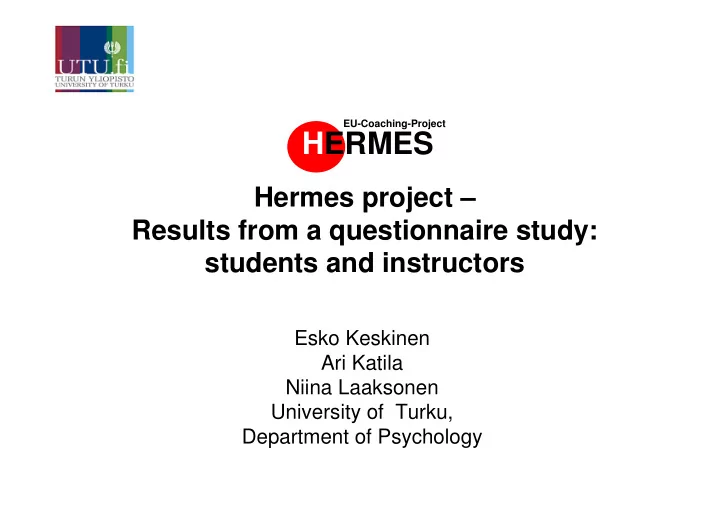

EU-Coaching-Project HERMES Hermes project – Results from a questionnaire study: students and instructors Esko Keskinen Ari Katila Niina Laaksonen University of Turku, Department of Psychology
Research questions: How effective was a three day coaching seminar for driving teachers as evaluated by students and teachers. 1. How students evaluate driving teachers’ style of teaching before and after (three month) the teachers have been learning coaching style method in the three day seminar? 2. How teachers evaluate the three day coaching seminar? 3. How teachers evaluate their own teaching style after (three months) the three day seminar?
What was evaluated in the study (students' point of view students experiences of teaching (before) teachers seminar students experiences of teaching (after 3 month) not evaluated: students' learning of knowledge and skills not evaluated: novice drivers' behaviour in traffic offences & accidents
SUBJECTS The amount of the subjects Measurement 1. 2. Driving students 158 127 Driving instructors 17 14 Hermes WP 6 Evaluation 4
SUBJECTS Driving students Measurement and the amount of subjects, age & gender ___________________________________________ Age Gender Measurement N M Male Female 1. 158 21.31 76 80 2. 127 20.23 70 56 ___________________________________________
SUBJECTS Driving students When the questionnaire was completed (%) Measurement Questionnaire was completed after 1. 2. _____________________________________________ Theory lesson 61 42 Safe driving course 32 33 Feedback from driving 4 13 Driving lesson 3 13 _____________________________________________ Total (n) 100 (158) 100 (127)
Before reading the results Evaluation design and data collection method 1. Design was before after between subjects design: students could experience a teaching situation only before or after 2. Data collection methods was based on "absolute" (amount evaluation) evaluation of own experience on a scale 1 – 5, where 5 means high amount and 1 low amount of certain component of experience E.g. How active on the scale 1 -5 are YOU at the moment?
Before reading the results 3. Ceiling effect: high assessments (good points) already before, difficult to be better! 4. The after seminar evaluation happened 3 month after seminar – regency effect was not any more valid If there are now positive result, then they are reliable.
Before reading the results Validity of results The measurements concern students' and teachers' evaluations of their experiences of teaching style. The questions are designed to measure two of the most important goals of coaching style teaching and four variables which mainly describe methods used in coaching style teaching. The aim was to measure how coaching style teaching was realized in driving teachers' teaching and not how effective (concerning knowledge and skills) it was as a method for increasing learning.
Driving students Mean variables Driver’s experience of his personal growth as a driver Driver’s possibility to take responsibility of his own learning and behaviour Driver’s activeness Interactivity of the teaching style Driver’s experiences of the course leader Driver’s contentment with the course
RESULTS Driving students 5 4,61 4,57 4,46 4,45 4,5 4,24 4,19 3,89 3,82 4 3,65 3,66 3,37 3,28 3,5 3 M1 2,5 M2 2 1,5 1 Personal Possibility to Activeness*,** Interactivity of Experiences of Contentment growth as a take the teaching the course with the course driver * responsibility style leader The means for the mean variables (M1= first measuremet, M2= second measurement) 11 Hermes WP 6 Evaluation
In more detailed analysis it was found that during the course (after teachers' coaching seminar) students who were over 20 years experienced * more personal growth as a driver than before * more possibilities to take responsibility than before * their course leader better to be than before There were no changes in the experiences of younger students – they were not less satisfied
RESULTS Driving instructors 4,5 4,04 4,01 3,85 4 3,52 3,5 3,5 3,06 3 2,5 M 2 1,5 1 Personal Possibility to Activeness Interactivity of Experiences of Contentment growth as a take the teaching the course with the driver responsibility style leader course The means (M) of the mean variables for instructors experiences of the coaching seminar Hermes WP 6 Evaluation 13
RESULTS Comparisons between driving students’ experiences and driving instructors’ evaluations in after measurement 5 4,57 4,46 4,38 4,24 4,5 4,06 3,89 3,82 3,81 3,79 4 3,68 3,47 3,37 3,5 3 Mi 2,5 Ms 2 1,5 1 Personal Possibility to Activeness Interactivity of Experiences of Contentment growth as a take the teaching the course with the course driver responsibility style* leader* *Significant difference for The interactivity of the teaching style (U= 580.50, p<.05) Mi= Means for the driving instructors 14 Ms= Means for the driving students The experiences of the course leader (U= 358.00, p<.001) Hermes WP 6 Evaluation
Summary and discussion Results show that • teachers evaluated the three day seminar in a favorable way • it is possible to change teachers teaching style towards coaching style with a three day seminar • students evaluated coaching way of teaching partly in a more favorable way than the traditional one • especially older (over 20) students favored coaching style • teachers and students evaluated teaching style quite in a same way
Discussion Results do not show that • students would learn more traditional driving school knowledge and skills when coached - but they felt more personal growth, which is the main aim in coaching – to learn more of him or herself as a driver - and they also felt to be more active when coached – coaching style teaching activates students • coached novice drivers at the beginning of their driving career would be more safe than the ones that have got traditional teaching – but we have good reasons to believe that coaching is increasing also their responsibility as drivers
Recommend
More recommend